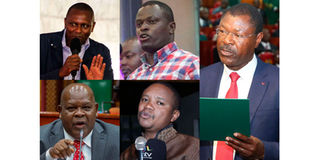Key people who will champion Ruto’s agenda in Parliament

From left: Kimani Ichung’wah, Ndindi Nyoro , National Assembly Speaker Moses Wetang'ula, George Murugara and Kimani Kuria.
Moses Wetang’ula – Speaker of the National Assembly
Among the issues Mr Wetang’ula may be called upon to provide guidance is whether Cabinet Secretaries can appear on the floor of the House to answer questions directly from MPs as opposed to the current situation where they answer the questions through chairpersons of various departmental committees.
The Raila Odinga led Azimio la Umoja coalition has already said CSs cannot be allowed to appear on the floor of the House by just changing the Standing Orders saying the move must be subjected to a referendum.
Mr Wetangula is also the chairperson of the Procedures and House Rules committees, is expected to steer the changing of Standing Orders to allow CS appear before the House.
He will also preside over debate on a number of constitutional amendments that the President has written to Parliament about, among them the creation the office of the opposition leader.
“Upon resumption of the House, I shall facilitate general debate on the message of the President on matters relating to the amendment of the constitution in accordance with the Standing Orders,” Mr Wetang’ula said.
Kimani Ichung’wah – Majority Leader
He is the link between the Legislature and the Executive.
Mr Ichung’wah has the daunting task of promoting and championing the agenda of the Executive in Parliament. With the help of Majority Whip, he will be expected to marshal numbers to ensure all the government backed Bills sail through.
With the ruling coalition not having an absolute majority, he will be expected to reach out to those on the minority side for constitutional changes that require two-thirds support.
His first major task of the year will be steering a Bill to create the office of the opposition leader, which Azimio has said it will oppose if it contains proposals curtailing its oversight role. He will also play a key role in ensuring the passage of President William Ruto’s first budget expected in Parliament by February 23.
Ndindi Nyoro – Chairman, Budget and Appropriation Committee
Occupying one of the offices considered to have the mandate of shaping all plans by the Executive, Mr Nyoro will be an important cog in the President’s administration.
With a Supplementary Budget already in the House, Mr Nyoro’s first major task is to ensure that it lives up to the expectations of the President and that MPs from both political divides are convinced to pass it.
During the State of the Nation address, President Ruto ordered the National Treasury to slash Sh300 billion from the current financial year’s budget as part of austerity measures.
The slashing of the Sh300 billion is contained in the Supplementary Budget. The Parliamentary Budget Office has already warned that the budget cut could have major economic implications.
Mr Nyoro’s major daunting task will be the successful delivery of President Ruto’s full year budget for 2023/2024.
George Murugara – Chairman, Justice and Legal Affairs Committee
After successful execution of four petitions that saw three electoral commissioners resign, the lawmaker is set to dive into even deeper waters this year.
The constitutional amendment seeking to establish the office of official opposition is now at his door step, with a report expected in the House by February 14.
Mr Murugara is in a tricky situation; figuring out how to create the office without subjecting the country to a referendum, which the President said he is not interested in.
Legal experts including Law Society of Kenya have already told the president that his proposal to create the office must go through a referendum or suffer the same fate as the Building Bridges Initiative.
Kimani Kuria – Chairman, National Planning Committee
He is among those the President will heavily rely on to make life bearable for Kenyans this year.
The committee is responsible for monitoring and reporting on the implementation of the national budget on a quarterly basis. It is also tasked with assessing and analysing the success of ministries and departments.





